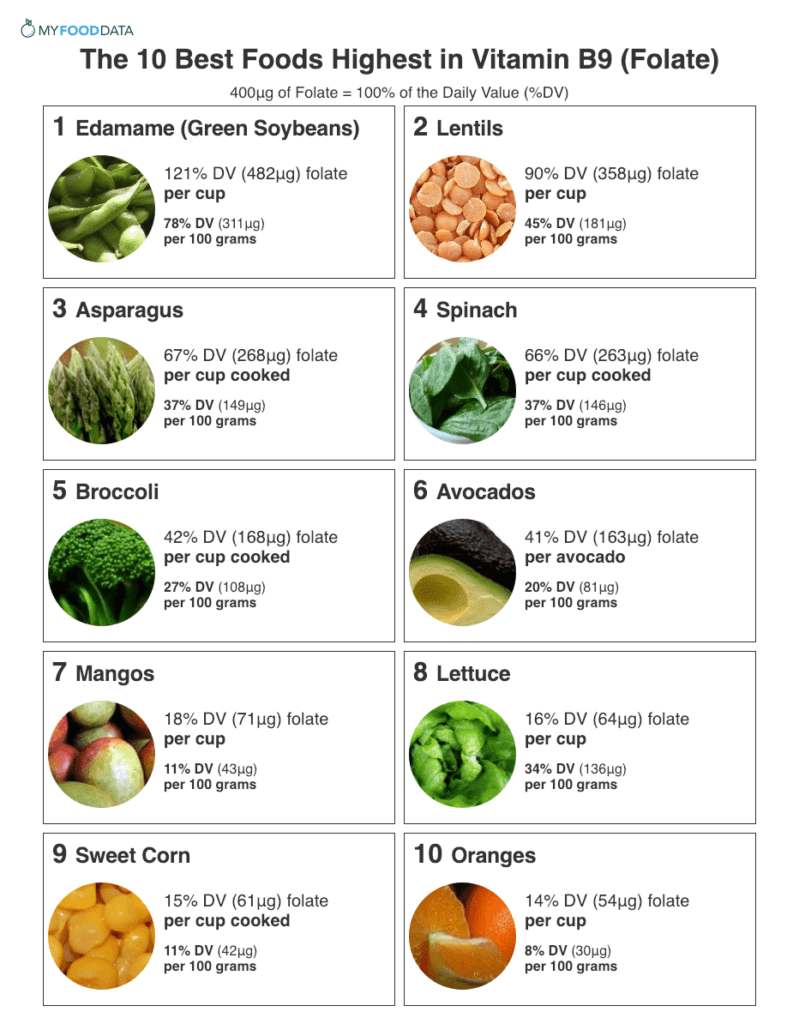What is Folate?
Folate is a water-soluble vitamin also known as vitamin B9. This vitamin is found in many foods such as green leafy vegetables, citrus fruit, nuts, fish and beans.

What is Folic Acid?
Folic acid is a synthetic form of folate (basically a vitamin B9 supplement that the body converts into folate) that is added to fortified foods (e.g. cereal or bread).
Folate function
- Folate helps the body make healthy red blood cells and prevent anaemia (red blood cells carry oxygen throughout the body and if the body does not make enough of these, a person can develop anaemia, leading to fatigue, weakness, and a pale complexion).
- Works with vitamin B12 and vitamin C to help the body break down, use, and create new proteins.
- Helps produce and repair DNA, the building block of the human body, which carries genetic information.
- Helps your unborn baby’s brain, skull and spinal cord develop properly to avoid development problems (called neural tube defects) such as spina bifida.
Recommended dose
Folate is a water-soluble vitamin, which means your body does not store folic acid and any excess amounts pass through the urine. As a result, folate must be consumed on a daily basis.
Individual folate levels differ depending on age and population group. While folate deficiency is not a major issue for people who eat a well-balanced diet, many people do not meet recommended intakes.
⠀
The UK government and devolved administrations recommend that all women who are pregnant or plan to become pregnant take a folic acid supplement containing 400 micrograms of folic acid every day prior to conception and until the 12th week of pregnancy. They are also advised to increase their daily folate intake by eating more folate-rich and folic acid-fortified foods. You can’t get too much folate from foods that naturally contain folate.
⠀
Scientific Advisory Committee on Nutrition (SACN) concluded that folic acid intakes up to 1,000 mcg per day are not associated with masking anaemia associated with vitamin B12 deficiency and noted that the prevalence of B12 deficiency, with or without anaemia, did not increase after mandatory fortification was introduced in the US. However, it is not recommended to take more than 1,000 mcg of folic acid (in a supplement form) daily, unless your doctor prescribes a higher amount.
⠀
Men and postmenopausal women shouldn’t routinely need more than 200 mcg of folic acid from a supplement.
A link between excess folic acid intake and cancer
Evidence is inconsistent. Some studies say that a good intake of folic acid may reduce the risk of colon cancer, however large amounts of folic acid (a dose of 10,000 mcg/day) could potentially fuel tumour progression in those who already have precancerous growths or cancer.
⠀
If you have any of the following conditions, you should consult your doctor before taking folic acid:
- epilepsytype
- 2 diabetes
- rheumatoid arthritis
- lupus
- inflammatory bowel disease (IBD)
- celiac disease
- if you’re undergoing kidney dialysis.
If you’d like to dive deeper, here’s a great video about One Carbon Metabolism, the role of Tetrahydrofolate (THF) and the Folate Cycle.




1 Comment